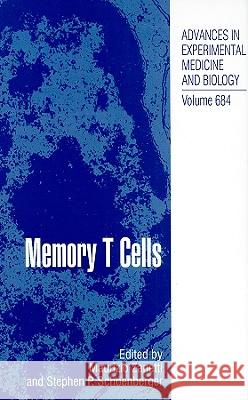Memory T Cells » książka



Memory T Cells
ISBN-13: 9781441964502 / Angielski / Twarda / 2010 / 203 str.
Memory T Cells
ISBN-13: 9781441964502 / Angielski / Twarda / 2010 / 203 str.
(netto: 843,44 VAT: 5%)
Najniższa cena z 30 dni: 848,19
ok. 16-18 dni roboczych.
Darmowa dostawa!
This book examines a range of topics related to memory T cells by laboratories that have invested their resources to understand the biology and the principles upon which memory T cells are generated, maintained and expanded upon re-encounter with antigen.
Wydanie ilustrowane
1. Memory Th1/Th2 Cell Generation Controlled by Schnurri?2 Toshinori Nakayama and Motoko Y. Kimura Abstract Introduction Schnurri Family Genes Shn?3 Shn?2 Role of Shn?2 in Naïve CD4 T and Effector Th2 Cells Role of Shn?2 in The Generation of Memory Th1/Th2 Cells NF??B Overexpression in Effector Th Cells Results in the Decreased Generation of Memory Th Cells Interesting Questions Raised by the Study on Shn?2 Conclusion 2. Transcriptional Regulat ion during CD8 T?Cell Imune Responses Ivana Munitic, César Evaristo, Hsueh Cheng Sung and Benedita Rocha Abstract The Regulation of Gene Expression: General Rules The Gene Regulatory Elements Involved in CD8 Responses Modifications of Gene Expression in CD8 Responses Different Infections May Induce Different Gene Expression Patterns The Identification of CD8 Subpopulations: Man and Mouse Differ Conclusion 3. The Role of Interleukin?2 in Memory CD8 Cell Differentiation Onur Boyman, Jae?Ho Cho and Jonathan Sprent Abstract Introduction Conclusion 4. The Role of Inflamation in the Generation and Maintenance of Memory T Cells Noah S. Butler and John T. Harty Abstract Introduction The Role of Inflammation during T?Cell Priming and Expansion Inflammation and T?Cell Contraction Inflammation Regulates the Rate of Memory T?Cell Generation Memory T?Cell Maintenance Conclusion 5. The Role of OX40 (CD134) in T?Cell Memory Generation Andrew D. Weinberg Abstract Introduction Background Role of Ox40/Ox40l Interaction in Memory T?Cell Generation and Function Providing an Exogenous Ox40 Signal (Ox40 Agonists) to Enhance Memory T?Cell Generation Altering Memory T?Cell Generation/Function through the OX40 Axis for Therapeutic Benefit in Autoimmunity, Cancer and Hosts Harboring Chronic Pathogens Conclusion 6. The Role of Precursor Frequency in the Differentiat ion of Memory T Cells: Memory by Numbers Amanda L. Marzo, Ryan T. Sowell and Bernadette Scott Abstract History of Immunological Memory Inroads intoUnderstanding T Memory Development Use of TCR Transgenics to Elucidate T?Cell Biology Precursor Frequency Affects Memory T?cell development One Cell, Many Fates Which Are the Better Protectors? Conclusion 7. CD8 T?Cell Memory Differentiat ion during Acute and Chronic Viral Infections Vandana Kalia, Surojit Sarkar and Rafi Ahmed Abstract Introduction CD8 T?Cell Responses following Acute Infection CD8 T?Cell Responses following Persistent Infection Conclusion 8. Longevity of T?Cell Memory following Acute Viral Infection Joshua M. Walker and Mark K. Slifka Abstract Introduction Memory T?Cell Responses following Acute Viral Infection Functional Attributes of Human Memory T Cells Conclusion 9. Principles of Memory CD8 T?Cells Generation in Relation to Protective Imunity Maurizio Zanetti, Paola Castiglioni and Elizabeth Ingulli Abstract Introduction T?Cell immunity—From activation to imprinting T?cell memory Considerations on the Parameters of the Primary Response That Influence the Generation of Memory T cells Memory CD8 T?Cell Subpopulations, Lineage Commitment and Protective Responses Memory CD8 T Cells Induced by Low Antigen Dose Vaccination Protect Mice from Influenza a Virus Infection—The Role of CD62hi memory CD8 T (TCM) cells Central Memory CD8 T Cells Correlate with Protection against SIV in Rhesus Macaques Principles for Programming Protective T?Cell Responses by Vaccination in the Immunologically Inexperienced Individual Principles for Reprogramming Protective T?Cell Responses by Vaccination in the Immunologically Experienced Individual The Role of Local Immunity in Protection by Memory CD8 T cells Conclusion 10. Memory T cells in Rhesus Macaques Monica Vaccari and Genoveffa Franchini Abstract Introduction Memory T cells in Rhesus Macaques In Vivo Manipulation of Memory T Cells in Non?Human Primates Differentiation of Memory T?Cells Subsets: Lesson from In Vivo Studies in Non?Human Primates Aging of T Memory
Maurizio Zanetti, MD, is a Professor of Medicine at the University of California, San Diego (UCSD), and member of the Moores UCSD Cancer Center. He is the Director of the Immunology laboratory at the Moores UCSD Cancer Center as well as of the Graduate Course in Immunology at UCSD. Main interests include the generation and maintenance of memory T cells with protective value against disease. These responses are studied with respect to cancer and influenza virus infection. His work in humans is devoted to to the immunology of telomerase reverse transcriptase, a prototype universal cancer antigen. He served in the program Committee of the American Society of Immunology, and as Associate Editor for the Journal of Immunology and Cellular Immunology. He is a member of the American Association of Immunologists and American Society for Clinical Investigation. He received his MD from the University of Padova, Italy. Stephen P. Schoenberger, PhD, is a member in the Laboratory of Cellular Immunology at the La Jolla Institute for Allergy and Immunology and adjunct faculty in the division of Hematology and Oncology at the University of California at San Diego School of Medicine. His main research interests include CD8+ T-cell immune memory and antigen presentation cell function. He is a member of the editorial advisory board of Journal of Experimental Medicine, and Associate Editor at the Journal of Immunology, and is a member of numerous national and international scientific organizations including the Dutch Immunology Society, The American Association of Immunologists. He received his PhD from the University of California in Los Angeles, USA.
1997-2026 DolnySlask.com Agencja Internetowa
KrainaKsiazek.PL - Księgarnia Internetowa









